Retiring sustainable planning professor crafted a career of purpose
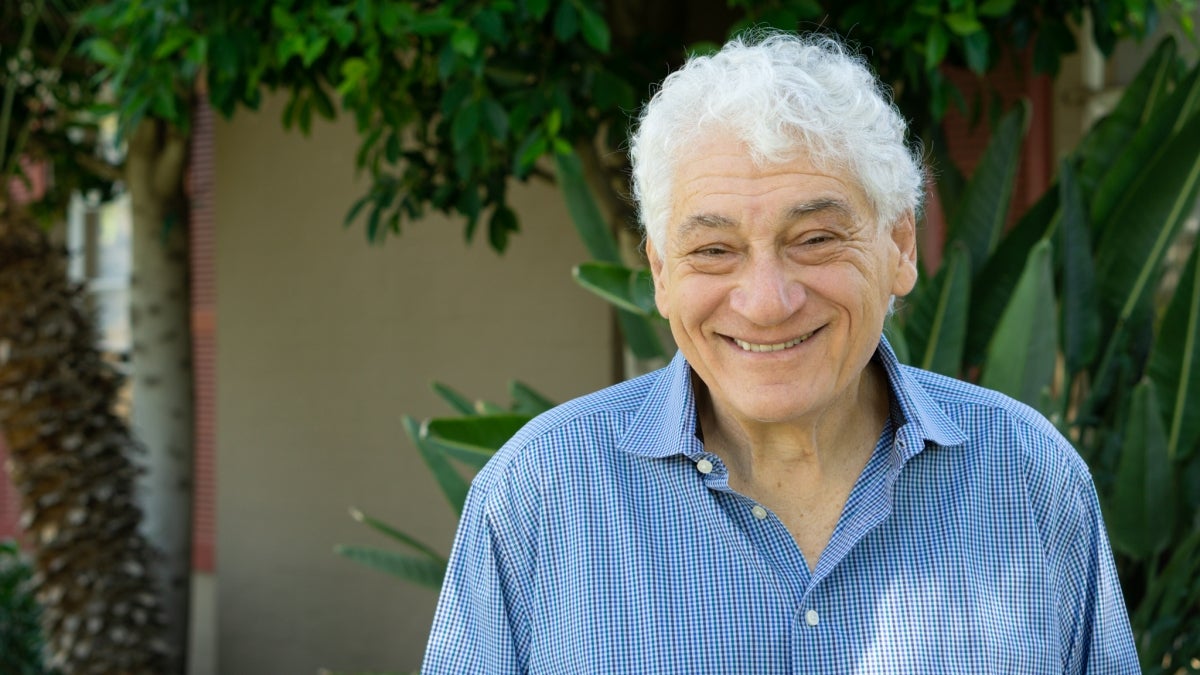
David Pijawka, sustainable planning professor. Photo by David Rozul/ASU
David Pijawka is an expert in many things, but as many will attest, he is a master of one: An undeniable dedication to service for others.
Pijawka has been at the helm of interdisciplinary research at Arizona State University for more than three decades, bringing together policy, sustainability, geographical sciences and urban planning in novel and innovative ways and applying them to community work.
“He always stressed through his own research and work that science is not to be kept inside of the walls of the university,” said Cecilio Ortiz García, a former PhD student of Pijawka's and a colleague and friend of more than 20 years. “He taught us that as sustainability scholars and researchers on resilience, we have an extra responsibility to utilize science for the health and well-being of minority and vulnerable populations, and to make a direct contribution to the resiliency of our own communities.”
After more than 35 years, Pijawka, sustainable planning professor in the School of Geographical Sciences and Urban Planning, is retiring as full-time faculty, but his legacy and impact remain on ASU, his students and the communities he continues to serve.
“The role of teaching is working with the next generation of students and doing work that will improve society in significant ways. If one does that, then there is a great sense of fulfillment and meaning,” Pijawka said. “It’s very fulfilling, there’s no question about it.”
Leadership in the classroom
Arriving at ASU in 1982, Pijawka took on a range of critical roles and academic positions over the course of his career. He served as full-time faculty for the School of Public Affairs, the School of Urban Planning and Landscape Architecture, and the School of Geographical Sciences and Urban Planning — establishing a record of excellence in each.
He helped lead the development of the undergraduate and Master of Urban and Environmental Planning programs, assisted in the establishment of the PhD program in urban planning, and helped usher more than 30 PhD students and many master's degree students through their efforts.
But his impact doesn't stop there. He has held appointments at various times as distinguished honors faculty fellow in Barrett, The Honors College; senior sustainability scientist, Julie Ann Wrigley Global Institute of Sustainability; associate director in the School of Geographical Sciences and Urban Planning; and affiliate faculty for the American Indian Policy Institute, the School of Transborder Studies and the School of American Indian Studies. He also served as the director of the interdisciplinary PhD program in architecture, planning and design in the College of Environmental Design and helped direct the Center for Environmental Studies.
“I was given these opportunities to move around, experience different disciplines, conduct interdisciplinary and innovative research that combined different areas. I feel very lucky that in no other place except ASU could I have done that,” he said.
Pijawka was an early proponent of themes like urban sustainability and resilience and was a key figure in advancing sustainability initiatives within ASU.
He created and taught one of the university’s largest courses, Sustainable Cities, now with more than 1,000 students per year and taught by two of his colleagues. He is the author of one of the leading textbooks on sustainability in the nation, “Sustainability for the 21st Century,” with co-author Bjoern Hagen, currently in its third edition and being used in more than 20 universities across the U.S.
His innovative research and forward thinking has brought him to speak around the world and earned him numerous awards and accolades. He is the recipient of the President’s Award for Environmental Excellence from Valley Forward (Arizona Forward) Association, the ASU Learning Innovation Award and is the recipient of the Distinguished Professional Planner Award, the highest honor offered by the Arizona American Planning Association.
At ASU, Pijawka was the principal or co-principal investigator for nearly 100 research grants and contracts, some of which were multiyear and into the millions of dollars, and a prolific author with more than 30 published books, monographs and government reports, averaging about one per year of service at ASU.
“David is one of our most significant faculty members. He is a great inventive brain capable of boundary-spanning across and between disciplines, but just as importantly boundary-spanning between inside the university and outside the university,” ASU President Michael Crow said. “He is and has been a tremendous asset. He has helped us evolve into one of the leading centers for sustainability thinking on the planet. He's taught students all over the world. He’s just been a tremendous contributor to everything that we have done.”
Grounding theory into practice for society
Pijawka devoted his career to applying his research and placing ASU and himself in the center of important community work and justice studies.
In the early 1990s, when a major explosion sent toxic chemicals and plumes through a low-income, primarily African-American South Phoenix neighborhood, Pijawka assembled a team from ASU and led one of the first studies in Arizona that applied urban planning and hazard research through the lens of justice, fairness and equity for a community of color.
“Many landfills and industries with toxic and hazardous waste were disproportionately located near African-American neighborhoods, showing a real injustice that caused adverse impacts to minority communities,” Pijawka said. “This was happening in our community, Phoenix. If we could help through research then that’s something beneficial and important, not only for the neighborhood but also for the broader science of justice and sustainability.”
For his innovative work and service, Pijawka was awarded the Outstanding Leadership in Education Award by the NAACP and his project sparked more research in environmental justice and equity across ASU, which still continues today.
“I always felt that, if I was going to go into university teaching, it would be for what, what would be the purpose? It would be to improve communities, improve our value systems, to reduce racial inequalities."
— Sustainability planning Professor David Pijawka
Pijawka also spearheaded similar environmental justice research for Native American nations. His research looked at how several Native American communities would be impacted by the siting of where high-level nuclear waste would be buried. Ultimately, this work led to much of Pijawka’s work in the last decade with American Indian Nations focused on resolving big societal issues through the development of emergency plans, land-use plans and housing. Additionally, he taught both in the areas of indigenous planning and tribal community planning.
Pijawka, together with his geography PhD student Jonathan Davis and Dean of Social Sciences Elizabeth Wentz, pioneered an original and innovative approach to develop resilient land-use plans that combines the participation of the community, with use of geographical information systems and spatial analysis.
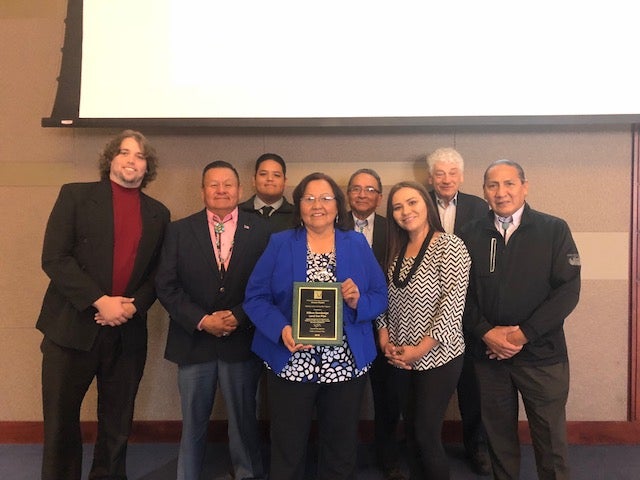
Jonathan Davis (far left) and David Pijawka (second far right) accept their award from the American Planning Association alongside members of the Navajo Nation, Dilkon Chapter
The work, called “Geodesign,” not only promotes a community working together but ensures that Native culture, customs and traditions are considered in resilience planning. In 2017, he and Davis were recognized by the Arizona Chapter of the American Planning Association for working alongside the Navajo Nation, Dilkon Chapter to successfully apply Geodesign and create the first-of-its-kind community land-use plan.
Pijawka’s unwavering dedication toward meaningful work roots strongly into his childhood.
His parents, survivors of the Holocaust, had Pijawka while displaced in a refugee camp in Baumberg, Germany, in 1947. He grew up in an environment saturated with injustice and inequality that he says has never been lost on him.
“I always felt that, if I was going to go into university teaching, it would be for what, what would be the purpose,” Pijawka said. “It would be to improve communities, improve our value systems, to reduce racial inequalities. I was brought up with these ideas to be a service to society, and (seeing) the injustices was an important part of me wanting to do this kind of work.”
A mentor in life
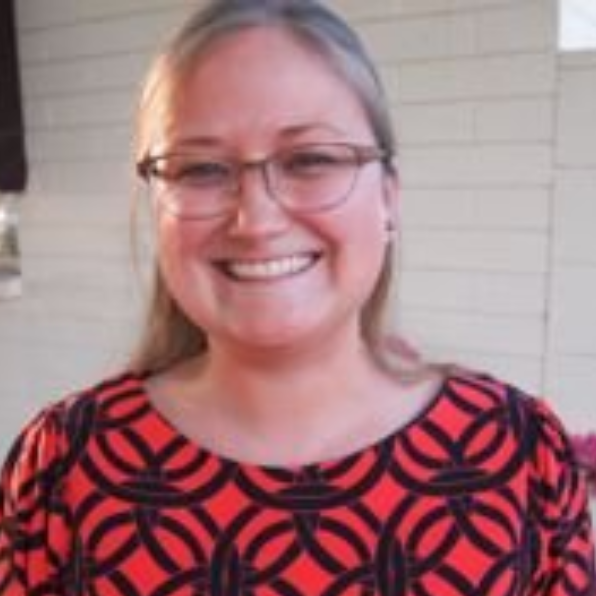
Eileen Baden, Master of Urban and Environmental Planning alumna, environmental planning instructor
Pijawka’s passion for his work is contagious, and his greatest gift of all may perhaps be his impact on the lives of his students, many of whom now have students of their own.
“He encompasses this idea that makes you feel like you can dream big when you talk to him. You don’t feel restricted to say what's achievable and what's not,” said former student Eileen Baden, who now teaches environmental planning at ASU. “I just really appreciate all the guidance and support he’s provided me. I know I’ll continue to do the same for students on my end.”
Jonathan Davis, who Pijawka advised and worked extensively with on community research planning projects for American Indian communities, said Pijawka’s compassion and mentorship were critical to his personal success.
“David is a leader and truly cares about the school and his students. His support, encouraging words and critical insight have allowed me to succeed,” Davis said. “During my dissertation I was diagnosed with a potentially fatal illness and his compassion and understanding was crucial for me to be able to continue to pursue my academic dreams. He is a fantastic mentor, a prodigious academic and a great friend.”
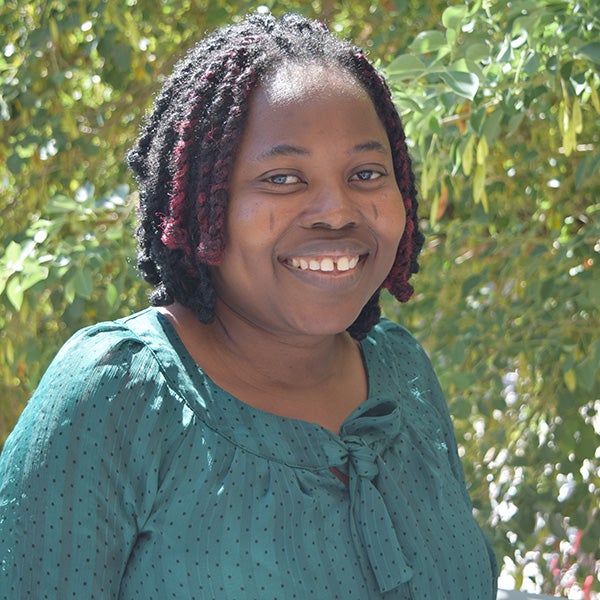
Nike Opejin, Master of Urban and Environmental Planning alumna, PhD sustainability student
Adenike (Nike) Opejin, a former international Master of Urban and Environmental Planning student of Pijawka from Nigeria, too, recalls Pijawka’s extraordinary compassion for his students.
“My first Christmas away from home in 2014, I was sitting at a coffee shop with David to wrap up work but I was so distracted. My phone was having problems and I kept checking to see if anyone was calling me from Nigeria,” Opejin said. “David the whole time was trying to figure out what was going on with me. He eventually found out and I was shocked at his response: ‘How much does it cost to get another phone?’ I told him and asked, 'Why?' The next thing he did was write me a check for that amount so I could talk to my family members back in Nigeria for Christmas. Tears ran down my eyes because the truth was that I couldn't afford a new phone at that time.”
“My relationship with David has gone beyond professor-student. He has become like a father in a foreign land who I trust to give me advice as I continue in this academic journey and life,” Opejin said, who is now pursuing her doctoral degree in sustainability at ASU.
As students attest, Pijawka has an unwavering belief in them and went above and beyond investing in their success.
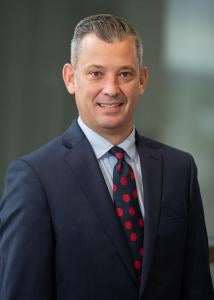
Stephen Buckman, PhD geography alumnus.
Former PhD student Stephen Buckman, who now serves as an assistant professor at Clemson University, says that Pijawka not only contributed to his professional success but his personal growth.
“David has had a huge impact on my professional life. Himself and my former PhD adviser Emily Talen are the two most important people in shaping who I am today. From early on David has been a great confidant and encourager in my work,” Buckman said. “But the biggest impact (on me) is his undying and unjudging friendship. He has truly become a dear friend of mine. David is compassionate about people and will give the shirt off his back to help his students succeed. Through my mentorship and friendship with David I will always make time for my future students and invest in them just as he has invested in me. He truly cares.”
A career comes full circle with intergenerational impact
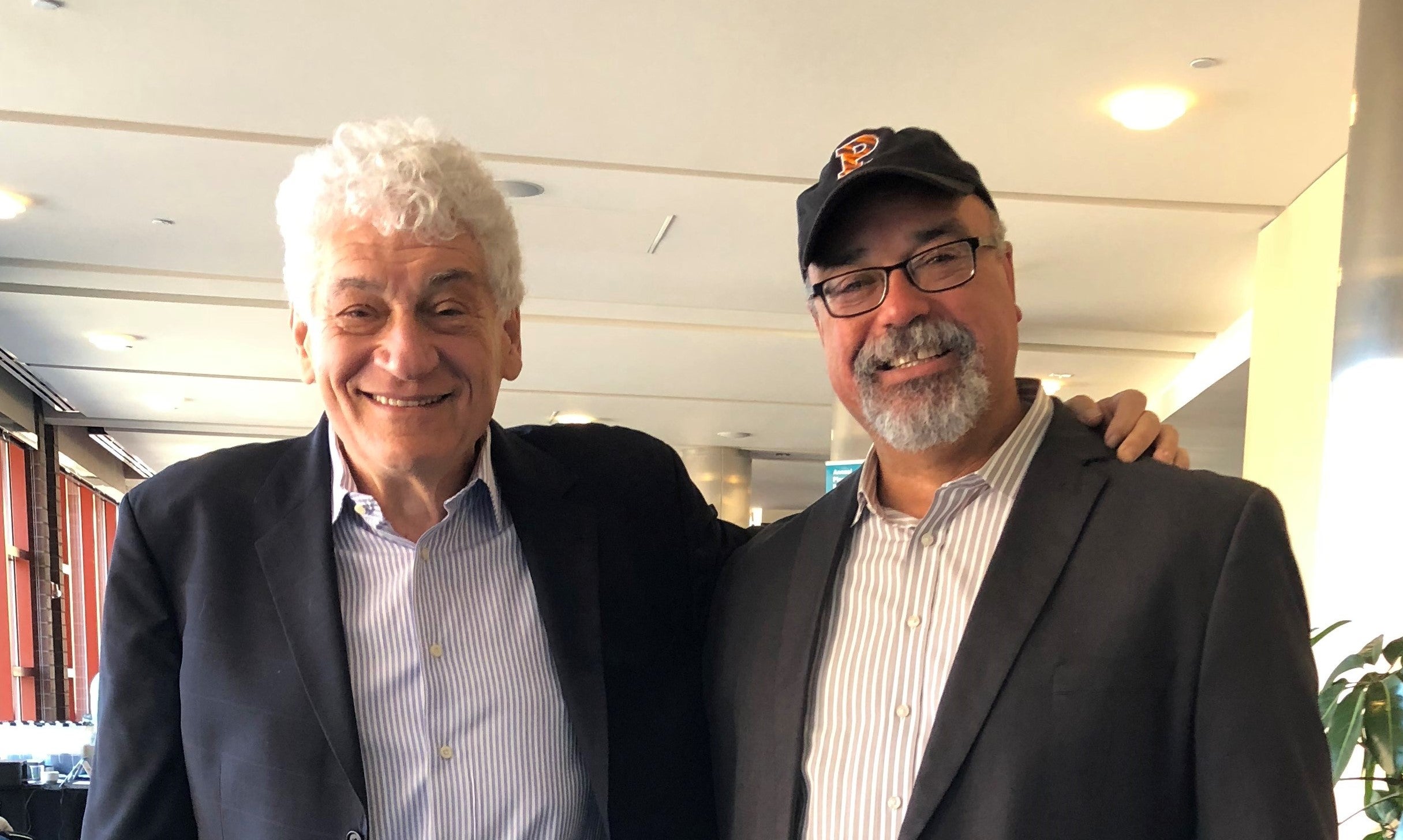
David Pijawka with Cecilio Ortiz García, PhD public policy and administration alumnus.
Serendipitously, in Pijawka’s final year as full-time faculty at ASU he has had the rare opportunity to work with two students who are students of one of his first PhD students 20 years prior, Cecilo Ortiz Garcia, now a professor of social science and political science at the University of Puerto Rico.
In 2018, when Hurricane Maria hit Puerto Rico, devastating the island, ASU responded to help with humanitarian efforts and enabled students from the University of Puerto Rico to fly to ASU and continue their studies.
Through the collaboration, two of Garcia Ortiz’s students came to ASU and Pijawka continues to work with them on their master's and PhD degrees today.
One of those students, Anaís Delilah Roque, says Pijawka’s mentorship was crucial for her at a hard time in her life.
“When I came to ASU after hurricane María, Pijawka was always making sure that I and his other mentees would feel well. This was crucial for me during my first month in ASU as I wanted to drop out,” Roque said. “I was suffering from depression and did not want to continue my studies. Pijawka worked with me to successfully finish his course on environmental planning and kept in contact with me over the summer with the hopes that I would come back. He connected me with colleagues of his as a way to pump me up to come to ASU and finish my degree. After much deliberation, I decided to come to ASU and I would have not made such a decision without David’s support. Dr. Pijawka is a true blessing.”
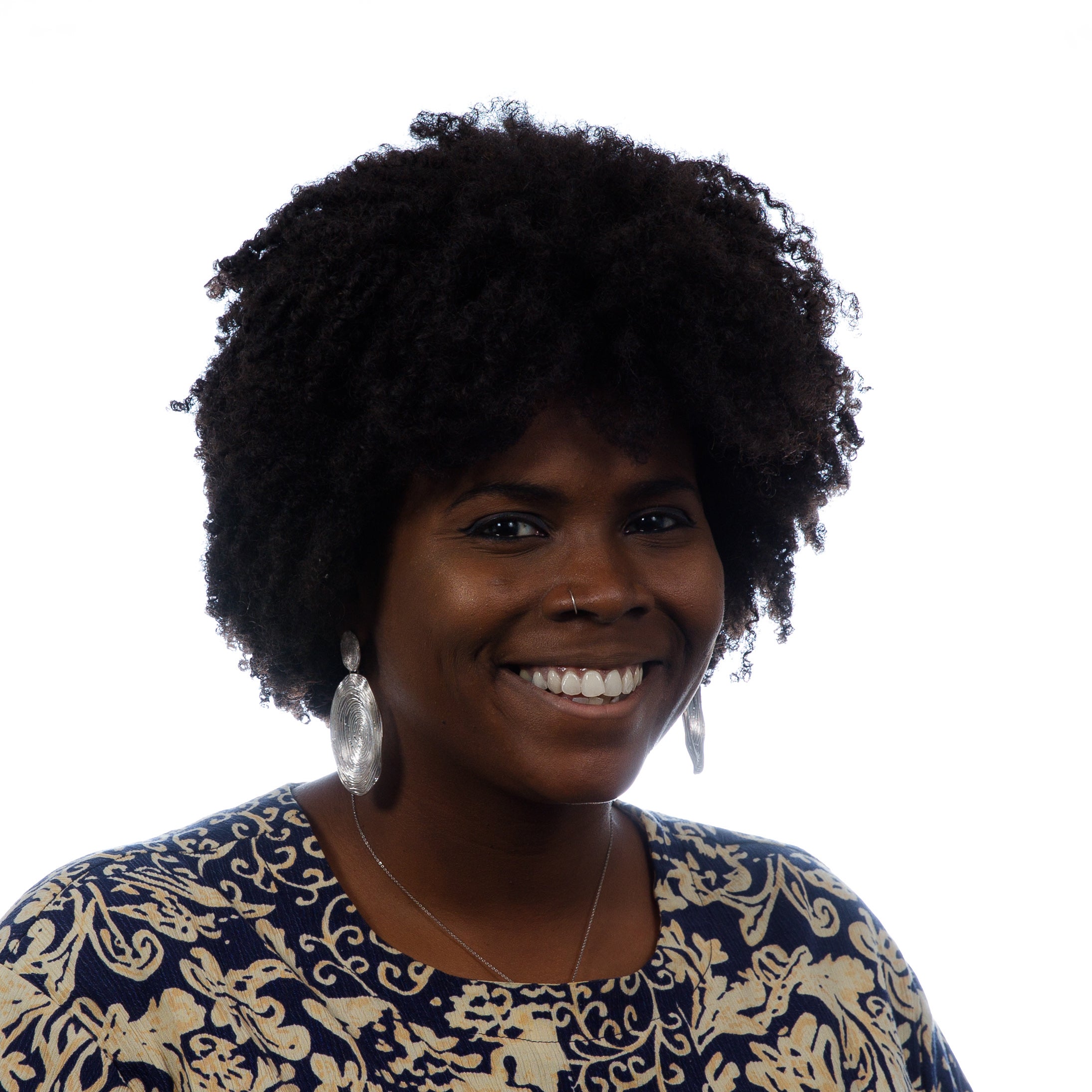
Anaís Delilah Roque, PhD environmental social sciences student.
For Pijawka, what his students have given him outweighs anything he’s ever received.
“Can you imagine how I feel? I’m working again with one of my first PhD students, and I'm working with two of his students on their dissertations. Is that not something special?” Pijawka said, his smile audible through the phone. “It’s so amazing that I am going to finish up my years at ASU with students who are students in Puerto Rico of my graduate student. I feel like an academic grandfather.”
“It makes me feel like my work is meaningful. It makes me feel like the work I did with students is valued and it goes from one generation to another,” Pijawka said. “It makes me feel absolutely fulfilled. It gives meaning to my life.”
Sun Devil for Life
In his next chapter of life, Pijawka looks forward to continuing a number of research projects with his students and colleagues, writing a biographical book about his parents, exploring work with a foundation and spending quality time with his wife, Judith, and three small grandsons.
“For me, it’s hard to leave and go into retirement, but it’s not really retirement. I’m just going to be doing different things, not within the university context but outside the university.”
Looking back at his storied career, the work he’s done and relationships he’s forged within the community and with students, Pijawka glows with pride.
“I’ve been here for quite awhile and I’ve just loved it. I really loved it. I love doing the work with people all over campus and with students and that's the real joy. I’ve had these incredible people that are very caring and unbelievably talented, and we are able to work together within a larger context of multi-disciplines to solve problems and apply them to communities.”
“The fact that my students are now doing this work that I started years ago, that knowledge is being created and being used for really important values, in really important ways to improve and save our communities; good stuff, aye?”
More Environment and sustainability
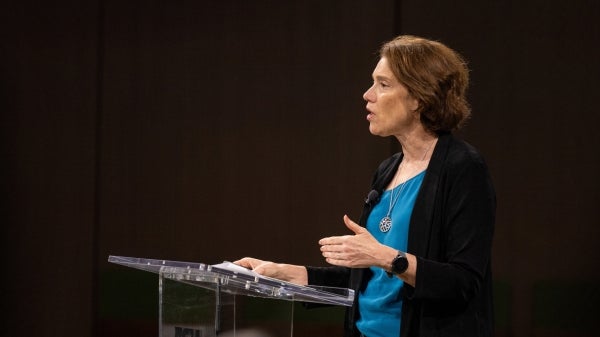
Researcher works on changing people's mindsets to fight climate change
Meaningful action to heal the climate requires a complete shift in the way people think and perceive each other, according to an…

NOAA, ASU offer workshop to bridge ocean exploration, education
Oceans are vital to sustaining life on Earth, as they produce over half of the oxygen we breathe and play a crucial role in…

A united front for sustainability and the economy
When four leaders of esteemed learning institutions and the mayor of Phoenix gather in one location at the same time, it’s a tip-…